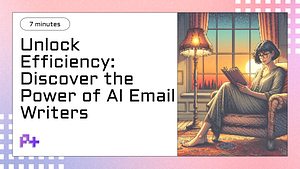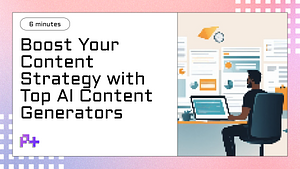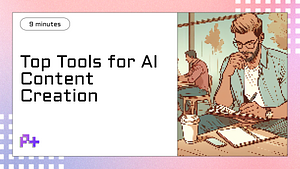1. What is AI in Marketing and Why It Matters
Artificial Intelligence (AI) in marketing refers to the use of advanced algorithms and machine learning techniques to analyze data, predict consumer behavior, and automate marketing processes. By leveraging AI marketing tools, businesses can gain insights from vast amounts of data, enabling them to personalize customer experiences, optimize campaigns, and enhance decision-making. For instance, AI can analyze customer interactions across various platforms, identifying patterns and preferences that help marketers tailor their strategies more effectively. This integration of AI not only streamlines marketing efforts but also drives better engagement by delivering the right message to the right audience at the right time.
The importance of AI in marketing cannot be overstated. As the digital landscape becomes increasingly competitive, companies must find innovative ways to capture and retain customer attention. AI marketing tools facilitate this by providing real-time analytics, which enable brands to adjust their strategies quickly based on consumer responses. Moreover, these tools can automate repetitive tasks, such as email marketing and social media posting, allowing marketing teams to focus on developing creative strategies and building relationships with customers. By harnessing the power of AI, businesses can increase efficiency, reduce costs, and ultimately improve their return on investment (ROI).
In addition to enhancing operational efficiency, AI in marketing is pivotal for driving customer satisfaction and loyalty. With AI-driven insights, brands can create highly personalized experiences that resonate with consumers. For example, recommendation engines powered by AI analyze user behavior to suggest products or content that align with individual preferences. This level of personalization not only fosters deeper connections with customers but also encourages repeat purchases and brand advocacy. As AI technology continues to evolve, its role in marketing will undoubtedly grow, making it essential for businesses to adopt these tools to remain competitive in a rapidly changing market.
2. Benefits of Using AI Marketing Tools
The use of AI marketing tools has revolutionized the way businesses approach their marketing strategies, offering a plethora of benefits that can enhance efficiency and effectiveness. One of the primary advantages is the ability to automate repetitive tasks, allowing marketers to focus on more strategic activities. For instance, AI tools can handle data analysis, email marketing sequences, and social media postings, streamlining processes that once consumed significant time and resources. This automation not only improves productivity but also reduces the likelihood of human error, ultimately leading to more accurate and reliable marketing outcomes.
Another significant benefit of AI marketing tools is their capability to analyze vast amounts of data quickly and efficiently. These tools leverage machine learning algorithms to identify patterns and trends within consumer behavior, enabling marketers to gain deeper insights into their target audience. By utilizing predictive analytics, businesses can anticipate customer needs and preferences, allowing for more personalized marketing efforts. This level of customization can enhance customer engagement, as tailored content is more likely to resonate with potential clients, thereby increasing conversion rates and fostering brand loyalty.
Lastly, AI marketing tools facilitate improved decision-making through real-time analytics and reporting. With the ability to gather and interpret data on campaign performance instantly, marketers can make informed adjustments and optimizations on the fly. This agility is crucial in today’s fast-paced digital landscape, where consumer preferences can shift rapidly. By utilizing AI-driven insights, businesses can allocate their marketing budgets more effectively, target the right demographics, and ultimately achieve higher ROI on their marketing efforts. In summary, the benefits of using AI marketing tools extend beyond mere automation; they empower businesses to make smarter, data-driven decisions that enhance overall marketing effectiveness.
3. Top AI Marketing Tools for 2025
As businesses increasingly rely on technology to enhance their marketing strategies, AI marketing tools are becoming essential for staying competitive in 2025. These tools leverage artificial intelligence to automate processes, analyze consumer data, and deliver personalized experiences. Here are some of the top AI marketing tools that are set to redefine how brands engage with their audiences this year.
One standout tool is HubSpot, which integrates AI across its platform to optimize marketing campaigns. With features such as predictive lead scoring and personalized email marketing, HubSpot allows businesses to tailor their communications based on user behavior. Its AI capabilities help marketers identify high-potential customers and automate routine tasks, making it easier to focus on strategic planning. Additionally, HubSpots robust analytics provide insights into campaign performance, enabling marketers to make data-driven decisions that enhance effectiveness and ROI.
Another noteworthy mention is Frase, an AI-powered content optimization platform. Frase uses natural language processing to analyze top-ranking content in any niche, helping marketers to create optimized articles and landing pages that meet search intent. By suggesting relevant keywords and topics, Frase streamlines the content creation process, ensuring that businesses can maintain a strong online presence in a crowded market. Its AI-driven insights not only improve content quality but also enhance SEO performance, making it a vital tool for brands looking to boost their organic reach in 2025.
Lastly, Drift stands out with its innovative approach to conversational marketing. This AI marketing tool focuses on engaging customers in real-time through chatbots and personalized messaging. Drift’s AI algorithms analyze user behavior to deliver relevant content and support, enhancing the customer experience and increasing conversion rates. By automating customer interactions, businesses can provide immediate assistance while gathering valuable data on consumer preferences, ultimately refining their marketing strategies. As the demand for personalized engagement grows, Drift positions itself as a leader in creating meaningful connections between brands and their audiences.
4. How to Choose the Right AI Marketing Tool for Your Business
Choosing the right AI marketing tool for your business can significantly enhance your marketing strategy and overall efficiency. With a plethora of options available, its essential to start by identifying your specific needs. Consider the primary goals of your marketing efforts—are you looking to improve customer engagement, automate content creation, analyze data, or enhance personalization? By clearly defining your objectives, you can narrow down the tools that align with your business requirements. For instance, if your focus is on data analysis, look for AI tools that specialize in predictive analytics or customer segmentation.
Next, evaluate the features offered by various AI marketing tools. Look for solutions that incorporate machine learning algorithms, natural language processing, and robust analytics capabilities. Its beneficial to choose a tool that can integrate seamlessly with your existing systems, such as CRM and email marketing platforms. Additionally, consider the user interface and the level of customer support provided. A user-friendly tool with comprehensive support can significantly reduce the learning curve and help your team maximize its potential. Reading user reviews and conducting trials can provide valuable insights into the tools effectiveness and usability.
Finally, budget is a crucial factor in your decision-making process. AI marketing tools come in various pricing structures, from subscription-based models to one-time purchases. Assess the return on investment (ROI) by considering how the tool can save time and optimize your marketing spend. Some tools may offer free trial periods or tiered pricing, allowing you to test their capabilities before making a financial commitment. By balancing your budget with the features and support you need, you can choose the right AI marketing tool that not only meets your current demands but also scales with your business as it grows.
5. Best Practices for Implementing AI in Your Marketing Strategy
Implementing AI marketing tools effectively requires a strategic approach to ensure that these technologies enhance your marketing efforts rather than complicate them. First, it’s essential to define clear objectives for your AI integration. Determine what specific goals you want to achieve—whether its improving customer engagement, personalizing content, or optimizing ad spend. By setting measurable objectives, you can select the appropriate AI tools that align with your business needs, ensuring a more seamless integration into your existing marketing strategy.
Next, prioritize data quality and integration. AI marketing tools rely heavily on data to function effectively. Ensure that your data is clean, well-organized, and relevant. This involves collecting data from various sources, such as customer interactions, website analytics, and social media metrics. Integrating these data points into your AI tools will allow them to provide more accurate insights and automated decisions. Additionally, consider using platforms that offer robust data integration capabilities to streamline the process and ensure that your AI tools have access to the most pertinent information.
Lastly, continuously monitor and optimize your AI-driven marketing campaigns. The digital landscape is dynamic, and what works today may not work tomorrow. Use analytics to assess the performance of your AI marketing tools regularly. Look for patterns in customer behavior and campaign effectiveness to refine your strategies continually. A/B testing can also be beneficial in determining which AI strategies yield the best results. By being proactive in adjusting your approach, you can maximize the benefits of AI in your marketing efforts and stay ahead of the competition.


